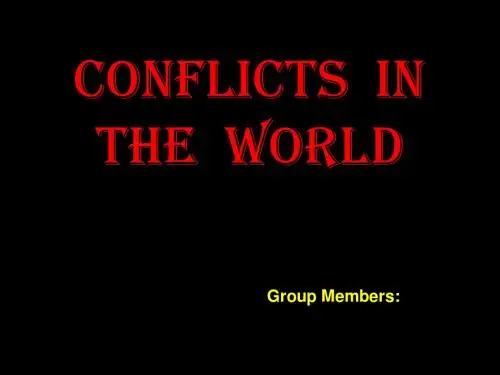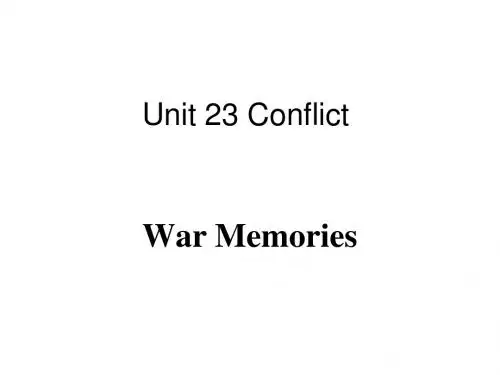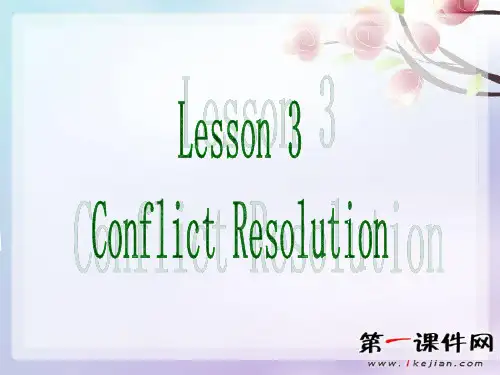华工大学英语小组展示Conflicts in the worldPPT课件
- 格式:pptx
- 大小:9.65 MB
- 文档页数:39
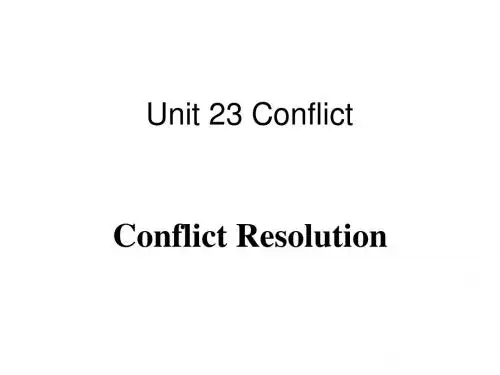
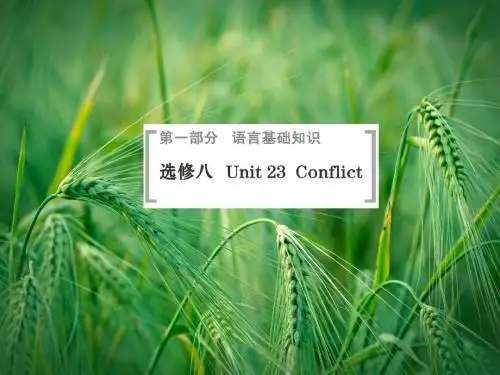
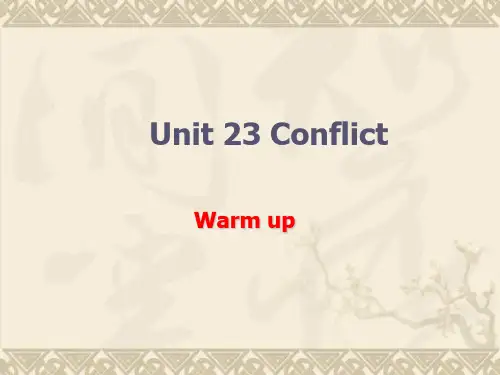
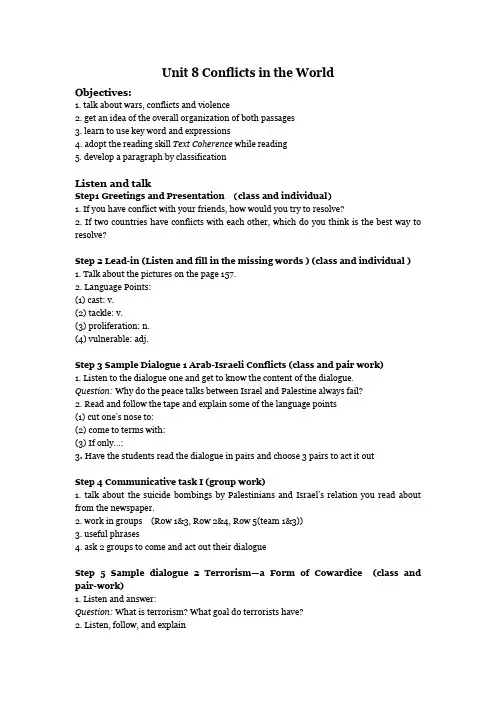
Unit 8 Conflicts in the WorldObjectives:1. talk about wars, conflicts and violence2. get an idea of the overall organization of both passages3. learn to use key word and expressions4. adopt the reading skill Text Coherence while reading5. develop a paragraph by classificationListen and talkStep1 Greetings and Presentation (class and individual)1. If you have conflict with your friends, how would you try to resolve?2. If two countries have conflicts with each other, which do you think is the best way to resolve?Step 2 Lead-in (Listen and fill in the missing words ) (class and individual )1. Talk about the pictures on the page 157.2. Language Points:(1) cast: v.(2) tackle: v.(3) proliferation: n.(4) vulnerable: adj.Step 3 Sample Dialogue 1 Arab-Israeli Conflicts (class and pair work)1.Listen to the dialogue one and get to know the content of the dialogue.Question: Why do the peace talks between Israel and Palestine always fail?2. Read and follow the tape and explain some of the language points(1) cut one’s nose to:(2) come to terms with:(3) If only…:3. Have the students read the dialogue in pairs and choose 3 pairs to act it outStep 4 Communicative task I (group work)1. talk about the suicide bombings by Palestinians and Israel’s relation you read about from the newspaper.2. work in groups (Row 1&3, Row 2&4, Row 5(team 1&3))3. useful phrases4. ask 2 groups to come and act out their dialogueStep 5 Sample dialogue 2 Terrorism—a Form of Cowardice (class and pair-work)1. Listen and answer:Question: What is terrorism? What goal do terrorists have?2. Listen, follow, and explain(1) hijack:(2) understandable:3. Have the students read the dialogue in pairs and choose 3 pairs to act it outStep 6 Communicative task II (group work and pair-work)Talk about air travel after the September 11 incident.Discussion1. If you have conflict with your friends, how would you try to resolve?2. If two countries have conflicts with each other, which do you think is the best way to resolve?AssignmentRead and practice the dialogues and make free dialogue in groupsRead and ExplorePassage A Return from the CageStep 1 Greetings and a brief revision (pair-work or group work)Ask one or two pairs (groups) to act out their own dialogue about interviewing the famous people.Step 2 Talking about the pictures and some related information:(class work or individual work)Related Information1. Bethlehem (West bank)Bethlehem (Hebrew: ―House of bread‖) is a city in the West Bank, five and a half miles from Jerusalem. The town, controlled since 1967 by Israel though administered since 1995 by the Palestinian National Authority, is specified in the Bible as the birthplace of both King David and Jesus Christ, and is regarded by Christians as a holy place.In Bethlehem, there are three refugee camps: Dheisheh Refugee Camp (11000 inhabitants), Aida Refugee Camp (6000 inhabitants), and Beit Jebreen Refugee Camp (3000 inhabitants).2. Austin (Texas)Austin is the capital of Texas and a noted educational center, with the main campus of the University of Texas located there. The city, with a population of 587873 within the city and 1044050 in the metropolitan area (1999 estimates), also serves as a manufacturing, commercial, and recreational center. Beginning in the 1980s, the arrival of several computer technology corporations and research organizations helped diversify the economy. As a result, Austin has experienced unprecedented growth.Step 3 Pre-reading (group discussion)1.Talk about the disastrous consequence of the conflicts with the help of the picturesand descriptions on the page 164.2. What are the usual causes of conflicts in the world?3. Who suffer from the wars and conflicts? And how?4. What do you think may be the solution to the Israel-Palestine conflict?Step 4 Global-reading (individual and class work)Skimming: Skim the passage and find out the main idea.Reference Key: The writer compares her life in the war place to what she enjoys now in the peaceful pace and hopes for the real peace in the whole world.Step 5 Further-reading (class work)Comprehensive questions on page162Summary:Muna Hamzeh is a writer who spent eleven years in a Palestinian refuge camp in Bethlehem. Now she is back in the United States and finding it difficult to adjust. She compares her life in the camp to what she enjoys now in Austin, Texas – the wide open spaces, contact with nature and, most importantly, freedom of movement. During her last two months at the camp there was frequent fighting, memories of which make her nervous every time she hears or sees helicopters and ambulances. She is also angry at the fact that a lot of the Israeli military equipment is actually made in the United States and paid for by US citizens through their taxes but that North Americans don’t seem to know about this, or to care. She worried that this indifference may result in another Vietnam War, with young people fighting a war and dying when they don’t even understand why.Discussion1.Talk about the disastrous consequence of the conflicts with the help of the pictures and descriptions on the page 164.2. What are the usual causes of conflicts in the world?3. Who suffer from the wars and conflicts? And how?4. What do you think may be the solution to the Israel-Palestine conflict?AssignmentRead Passage A in detailsStep 6 Language focusKey words and expressions1. overwhelm: v. to make powerless by using force, or to cause to feel sudden strong emotion.e.g. The terrorists were overwhelmed by the police squad and soon surrendered.The whole nation was overwhelmed by grief when the space shuttle exploded. overwhelming: adj. (1) difficult to fight againste.g. She felt an overwhelming urge to tell someone about what had happened.(2) very great or very largee.g. An overwhelming majority has voted in favor of the proposal.2. adjust to: to change slightly, esp. in order to make suitable for a particular job or newconditionse.g. Her eyes slowly adjusted to the darkness inside the church.A good teacher knows how to adjust his or her methods to suit the needs of the students.3. identification: n. something (such as an official paper) that is proof or a sign of identitye.g. The reporters were asked to show some identification before the security guards let them in.4. confine: v. to keep within some limitse.g. He is confined to the house by illness.Could you confine yourself to the subject, please?5. come by: to obtain, to gete.g. A ticket to the basketball game is not so easy to come by.6. in comparison to/with: examining or judging against another in order to show thepoints of likeness or differencee.g. In comparison with/to the French, the Britain eat far less fish.He is a famous American writer, but he pales in comparison with/to Hemingway.7. under way: in motion or operatione.g. Economic recovery is already under way.8. linger: v. to take a long time to leave or disappeare.g. It’s impossible to forget such horrific events—they linger in the memory forever.After the play finished, we lingered for a while hoping to catch sight of the actors.9. indifference: n. the quality, state, or fact of being not interested in or noticinge.g. The indifference to the homeless may result in serious social problems.Step 7 Exercises of Passage AAssignmentReview the textFinish the language focus exercises(page 163)Passage B Yes to Peace—No to ViolenceStep 1 Greetings and a brief revision (class work)1. How are you doing today? A nice day, isn’t it?2. Check exercisesStep 2 Talking about the pictures and some related information: (class work or individual work)Related InformationContinuing Unrest in the Middle EastAt the start of the 20th century, most of the Middle East was under European control. After World War I (1914-1918). Britain and France dominated the region. The tide began to turn when most Arab countries achieved independence from Britain or France in the1930s and 1940s. The United Nations (UN) voted in 1947 to divide Palestine between the Jews and Arabs, but Arab states rejected the plan. In 1948, when Britain troops left Palestine, the Jews declared the independent state of Israel. The Arab states unsuccessfully attacked Israel, followed by Israeli invasion to Arabic lands. Numerous wars and peace talks later, the Palestinian problem remains unsolved, and Arab-Israeli relations remain hostile.Step 3 Pre-reading (individual and class work)1. Try to describe the pictures on the page 1662. Why did some people oppose Yitzhak Rabin’s efforts to bring about peace?3. How long is the road to peace between Israel and Palestine?Step 4 Global-reading (individual and class work)Skimming: Skim the passage and find out the main idea.Reference Key: The passage is a transcription of Yitzhak Rabin’ last speech, made at a peace rally in Tel Aviv in November 1995.Step 5 Further-reading (class work)Comprehensive questions on page169Summary Yitzhak Rabin fought in the Israeli army for 27 years, rising to the rank of General. In 1992 HE BECAME Prime Minister. He was committed to the peace process and negotiated with the Palestine Liberation Organization (PLO). He and Yasir Arafat agreed to work together for peace. Although this accord was generally thought to be a very good thing, there were some Jewish hardliners who did not agree with the idea of working together with the PLO. The passa ge is a transcription of Rabin’s last speech, made at a peace rally in Tel Aviv in November 1995. He states his conviction that peace is possible and acknowledges the role that Egypt, Morocco and Jordan had played in the negotiations. He makes a plea for peace and asks the Israeli people to support the peace process. Ironically he was assassinated by a young Jewish hardliner moments after giving the speech.Step 6 Language focuspromise: n. a settlement of differences in which each side makes concessionse.g. The government has said that there will be no compromise with terrorists.The Union refused any compromise and threatened another strike.2. rally: n. a large esp. political public meetinge.g. Rallies are being held across the country to celebrate the victory.Thousands of people attended the protest rally against racial discrimination.3. take advantage of: (1) to make use ofe.g. You should learn to take advantage of the mistakes made by your rivals.(2) to make unfair use ofe.g. I think she is taking advantage of his love.4. erode: v. to rub or be rubbed away graduallye.g. Wind and rain have eroded the statues into shapeless lumps of stone.His rude behavior at the party has eroded my respect of him.5. condemn: v. to criticize strongly, usually for moral reasonse.g. The terrorist action has been condemned throughout the world.The oil spill at sea was condemned as an environmental crime.6. aspiration: n. strong desire; ambitione.g. Mary’s aspirations to help others come from her own misfortune in childhood.7. engage in: to take part ine.g. In some countries women still do not have the right to engage in politics.In his spare time, he engages in voluntary work at hospital.8. prolonged: adj. continuing for a long timee.g. Prolonged use of the drug is known to have harmful side-effect.The decision was finally made after a prolonged debate.9. fraught: adj. filled (with); chargede.g. These negotiations have been fraught with difficulties from the start.The adventure through the desert was fraught with troubles and dangers.10. exhaust: v. to use up completelye.g. The boy exhausted his mother’s patience with too many questions.It is estimated that some rare mineral resources will be exhausted in a few decades.Discussion1. Try to describe the pictures on the page 1662. Why did some people oppose Yitzhak Rabin’s efforts to bring about peace?3. How long is the road to peace between Israel and Palestine?AssignmentReview the textFinish the language focus exercises (page 170-171)。
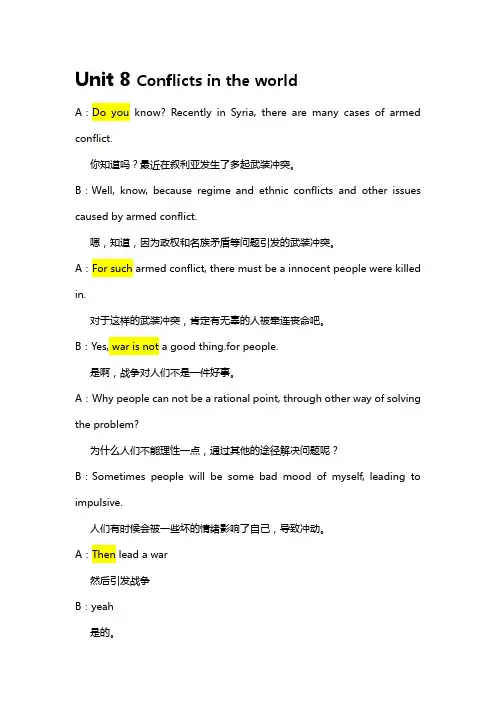
Unit 8 Conflicts in the worldA:Do you know? Recently in Syria, there are many cases of armed conflict.你知道吗?最近在叙利亚发生了多起武装冲突。
B:Well, know, because regime and ethnic conflicts and other issues caused by armed conflict.嗯,知道,因为政权和名族矛盾等问题引发的武装冲突。
A:For such armed conflict, there must be a innocent people were killed in.对于这样的武装冲突,肯定有无辜的人被牵连丧命吧。
B:Yes, war is not a good thing.for people.是啊,战争对人们不是一件好事。
A:Why people can not be a rational point, through other way of solving the problem?为什么人们不能理性一点,通过其他的途径解决问题呢?B:Sometimes people will be some bad mood of myself, leading to impulsive.人们有时候会被一些坏的情绪影响了自己,导致冲动。
A:Then lead a war然后引发战争B:yeah是的。
A:Do you think what a good way to reduce the occurrence of conflict?那你觉得有什么好的办法减少冲突的发生吗?B:I think that a good communication between countries is very important. Therefore, the communication consultation is a good way.我认为国家与国家之间的良好沟通很重要。
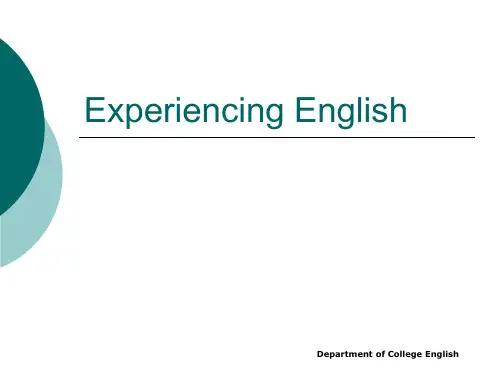
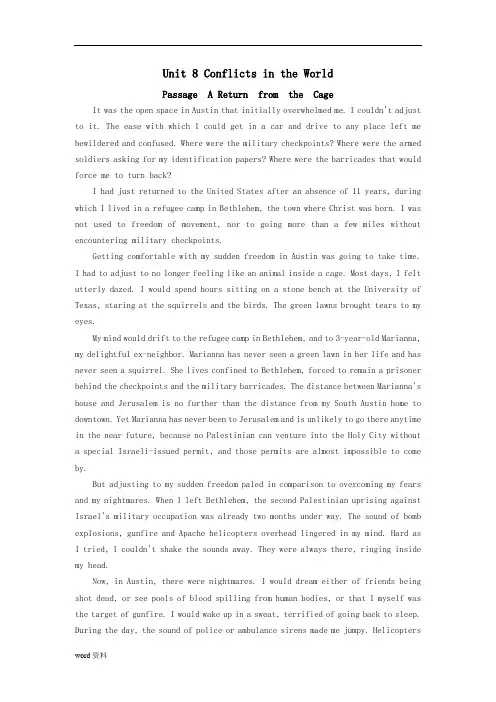
Unit 8 Conflicts in the WorldPassage A Return from the CageIt was the open space in Austin that initially overwhelmed me. I couldn't adjust to it. The ease with which I could get in a car and drive to any place left me bewildered and confused. Where were the military checkpoints? Where were the armed soldiers asking for my identification papers? Where were the barricades that would force me to turn back?I had just returned to the United States after an absence of 11 years, during which I lived in a refugee camp in Bethlehem, the town where Christ was born. I was not used to freedom of movement, nor to going more than a few miles without encountering military checkpoints.Getting comfortable with my sudden freedom in Austin was going to take time.I had to adjust to no longer feeling like an animal inside a cage. Most days, I felt utterly dazed. I would spend hours sitting on a stone bench at the University of Texas, staring at the squirrels and the birds. The green lawns brought tears to my eyes.My mind would drift to the refugee camp in Bethlehem, and to 3-year-old Marianna, my delightful ex-neighbor. Marianna has never seen a green lawn in her life and has never seen a squirrel. She lives confined to Bethlehem, forced to remain a prisoner behind the checkpoints and the military barricades. The distance between Marianna's house and Jerusalem is no further than the distance from my South Austin home to downtown. Yet Marianna has never been to Jerusalem and is unlikely to go there anytime in the near future, because no Palestinian can venture into the Holy City without a special Israeli-issued permit, and those permits are almost impossible to come by.But adjusting to my sudden freedom paled in comparison to overcoming my fears and my nightmares. When I left Bethlehem, the second Palestinian uprising against Israel's military occupation was already two months under way. The sound of bomb explosions, gunfire and Apache helicopters overhead lingered in my mind. Hard as I tried, I couldn't shake the sounds away. They were always there, ringing inside my head.Now, in Austin, there were nightmares. I would dream either of friends being shot dead, or see pools of blood spilling from human bodies, or that I myself was the target of gunfire. I would wake up in a sweat, terrified of going back to sleep. During the day, the sound of police or ambulance sirens made me jumpy. Helicoptersflying overhead made me uneasy. I had to constantly remind myself that these were most often civilian and not military helicopters. I had to remind myself that the ambulances were not rushing to the wounded demonstrators.I looked around me, and I wondered if anyone realized, or even knew, that the Apache helicopters being used by the Israeli military to shell innocent Palestinian civilians are actually made in this country! As a writer in Palestine, I had regularly visited bombed-out houses in search of stories. The home of a young nurse sticks out in my mind. A few miles away from the stable in Bethlehem where Christ is said to have been born, her house came under attack by Israeli tanks and was completely burned. I held the remains of some of the tank shells in my two bare hands and read the inscription: "Made in Mesa, Arizona."I wanted to stand on a chair and scream this information to everyone walking through the mall. The tear gas civilians inhale in the Palestinian Territories is made in Pennsylvania, and the helicopters and the F-16 fighter planes are also made in the USA. Yet here in this society, no one appears to care that their tax money funds armies that bring death and destruction to civilians, civilians who are no different from civilians in this country.And I worry about the indifference in this country. I worry because someday, young American men will find themselves fighting another Vietnam War - this time possibly in the Middle East - without a notion of what it is they are doing there. And we will have a repetition of history: Mothers will lose sons and wives will lose husbands in an unnecessary war. I have been repeating this warning in all the talks I have been giving in the past nine months. No one took me seriously. I couldn't understand why young Americans, with their whole futures ahead of them, should go to die in a war they will not understand.逃出牢笼刚回到奥斯丁的时候,使我感到无所适从的是这里的广阔自由天地。
